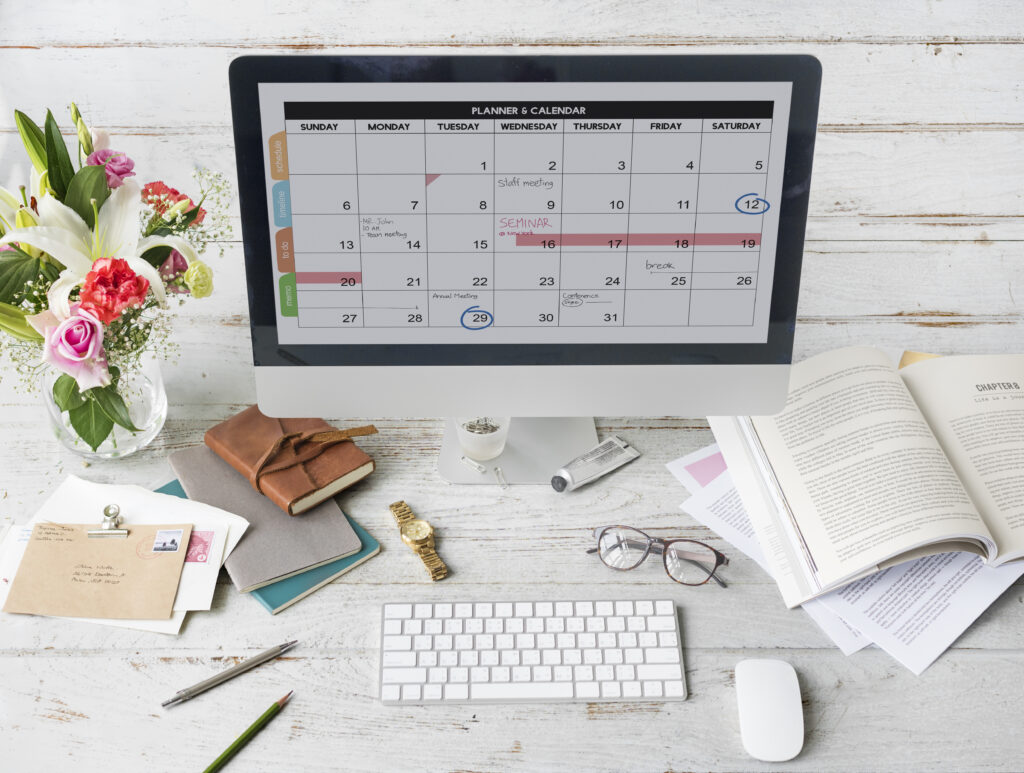From SMART goals to limiting distractions, embrace these practical time management tips to help you reduce stress, create balance, and take control of your day.
Do you ever wish you had an extra few hours each day? It can seem like that’s the only way to ever get to the bottom of your to-do list. But what if it’s not about having more time, but making the most of the time you do have?
For many of us, juggling work, family, and personal commitments can be overwhelming (and eventually burns us out). But with a few simple time management strategies, you can take control of how well you use your time and ease the stress of daily life.
What is Time Management?

Time management is the process of planning and organizing how to divide your time between different tasks and activities. When we manage our time well, we can work smarter, not harder. We naturally accomplish more, and feel less stressed or rushed while powering through the day.
Before we dive into our best time management strategies, however, it’s important to understand what time management is not. It’s not about cramming as much as possible into every hour, or rushing through your tasks without mindfulness or intention. It’s about creating balance and space in your schedule to give yourself enough time to do the most important things well, and breathe.
Why is Time Management Important?

If you’ve ever felt drained or caught a cold after a busy week (or month), you’ve experienced the negative effects of a poorly managed schedule. Without time management, we’re more likely to experience stress, overwhelm, burn-out, and anxiety. This doesn’t only sabotage our mental health, but has real, tangible effects on our physical health, too.
Too much stress has been proven to increase our risk of various health issues, including high blood pressure, heart disease, and weakened immunity. When stress hormones like cortisol remain elevated over time, they can wreak havoc on your body and lead to sleep disturbances, digestive problems, and chronic fatigue. In fact, stress can even slow down the body’s ability to heal and recover, making you more susceptible to illness and injury. This is why learning to manage your time effectively isn’t just a productivity tool—it’s a critical part of maintaining your overall health and well-being
On the flip side, managing your time well has a ripple effect on almost every aspect of your life. It helps reduce stress, boost productivity, and, most importantly, create space for what matters most. When you feel like you have control over your day, you’re less likely to feel overwhelmed, and more likely to enjoy both your work and your free time.
Good time management also leads to better decision-making. When you’re not constantly racing against the clock, you have more time to think clearly and make intentional choices, whether it’s what healthy meal to make for dinner or how to spend your weekend.
Signs & Consequences of Poor Time Management

How do you know if your time management could use some work? Here are a few signs:
- You constantly feel behind on tasks or overwhelmed by your to-do list.
- You frequently rush to meet deadlines or miss them altogether.
- You feel like you’re always busy, but never accomplish much.
- You are stressed, burned out, and lack the motivation you once had.
- You feel under the weather more often or are experiencing new health issues.
The consequences of poor time management go beyond just feeling frazzled. Over time, it can lead to increased stress, anxiety, and even health problems. Chronic stress can contribute to muscle tension, headaches, and digestive issues, which is why it’s so important to get a handle on time management early. Ready to find out how?
12 Time Management Tips to Ease Stress

Effective time management can help you regain control of your schedule and reduce stress. The following practical tips offer simple adjustments you can try now to make your day more productive and less chaotic:
1) Set SMART Goals
SMART goals are specific, measurable, achievable, relevant, and time-bound goals. Rather than vague resolutions, these clear objectives help you stay focused and organized, making it easier to manage your time around your priorities.
2) Prioritize
Not all tasks are created equal. Yet, if you find yourself checking off the easy to-dos and neglecting the big-hitters, it’s time to re-evaluate your priorities. Focus on the most important or urgent tasks first, using methods like the Eisenhower Matrix (sorting tasks into urgent/important categories) to guide your decisions.
3) Time Blocking
It’s hard to manage our time when we aren’t sure how we’re spending it. Time blocking can help. It’s like budgeting, but for your hours in the day instead of dollars in the bank. It’s simple – block out specific chunks of time for different activities. For instance, dedicate 30 minutes in the morning to emails and an hour in the afternoon to project work. This method helps you stay focused and prevents the urge to multitask and “productive procrastination.”
4) Delegate and Say No
You don’t have to do everything yourself. Easier said than done, but in the long run, learning to delegate can be a powerful skill to learn (and a huge weight lifted off your shoulders). Delegate tasks when possible, and learn to say no to commitments that don’t align with your priorities. This creates more space for what matters most.
5) Manage Distractions
For many of us, it’s not a lack of time that’s the real issue; it’s that distractions sneakily eat away at our time. Identify your biggest distractions—whether it’s social media, emails, or background noise—and take steps to reduce them. Simple changes like turning off notifications or setting up a quiet workspace can make a big difference.
6) Use Task Organization Tools
Managing your time can be challenging when you can’t visualize all you want to accomplish. Apps like Trello, Asana, or even a simple to-do list help by giving you an overview of the tasks at hand, plus ways to organize and prioritize them. These tools provide structure to your day and give you a clear overview of what needs to be done. Plus, they gamify productivity which can make getting things done feel even more rewarding.
7) Don’t Forget Breaks and Self-Care

For athletes, rest and recovery periods are just as crucial to muscle growth and resilience as training in the gym. Similarly, taking regular breaks and making time for self-care is essential for maintaining your focus and reducing stress. A simple way to integrate intentional breaks is with the Pomodoro Technique, where you work for 25 minutes and take a 5-minute break. You can adjust these time blocks to suit your best focus timing, or just stand up and stretch between tasks. It’s also a good idea to work in meditation, mindfulness, deep breathing, exercise, or other stress relief activities into your day. While this may seem like adding another task to an overflowing to-do list, these practices don’t take long and can help you work more effectively on your other tasks.
8) Start with the Hardest Task
It’s tempting to start your day by checking off a few small to-dos to feel like you’re getting ahead. But, this strategy can exhaust your energy before you get to start on the tasks that really matter. Instead, try “eating the frog,” or getting the biggest, most difficult task out of the way first. This creates momentum and makes the rest of your day feel more manageable.
9) Limit Multitasking
Think you’re getting more done by multitasking? Think again. Multitasking can actually slow you down and prevent you from fully focusing on each task at hand. Try to avoid multitasking by giving each task your full attention – you’ll quickly notice improved efficiency and produce better-quality work.
However, there are some ways you can work multitasking into your day to get more out of your hours. For instance, listening to a podcast while cooking or audiobook while tidying up is a great way to work more into your day, effortlessly.
10) Set Boundaries
Take a look at your to-do list and consider this: how much lighter would it be if you said “no” to the things you didn’t really want to do? The secret to effective time management is creating clear boundaries for work and personal time. Avoid overloading yourself by granting yourself permission to say no and setting realistic limits on how much time you’ll dedicate to each task or commitment.
11) Use a Timer
Sometimes we feel overwhelmed and rushed because we simply aren’t aware of time itself. Setting a timer for specific tasks can help keep yourself on track. Knowing you have a limited window can help you stay focused and prevent tasks from dragging out longer than necessary. Tools like Toggl are great for building self-awareness around how much time you’re spending on different tasks. This can help you identify where you’re losing time and find ways to improve your efficiency.
12) Analyze & Adjust
No plan is perfect. As you start implementing these strategies, regularly reflect on what’s working and what’s not in your time management routine. Then, make small adjustments that improve your efficiency and keep stress low.
Reset Your Stress with AlignLife

Mastering time management is one of the best ways to reduce stress from the root. When you feel in control of your schedule, you also become in control of your stress levels – and that has a profound impact on your mental health, physical health, and overall sense of balance.
Start by choosing just one or two tips that resonate with you and build from there. Remember, good time management isn’t about being perfect—it’s about creating habits that help you feel more in control.
Need more support in managing stress? Schedule a visit at AlignLife to explore how chiropractic care can help ease muscle tension and improve your overall well-being as you work toward your health and time management goals.



